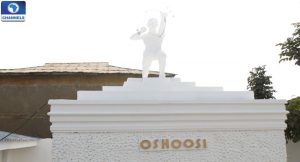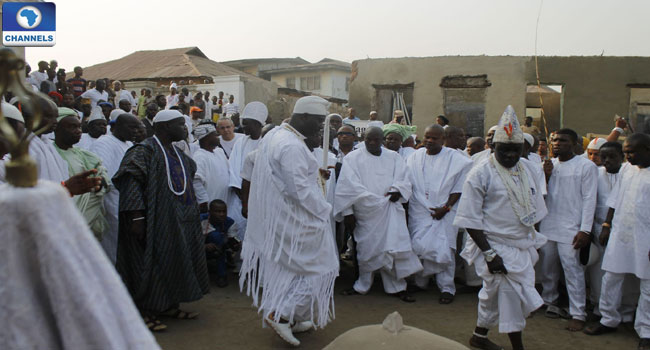
It is a deity believed to be the father of philanthropy and religious congregation for purity and sanity.
The Ooni of Ife, Adeyeye Ogunwusi (Ojaja II), during the festival, proffered Yoruba traditional religion as a tool in solving the challenges of peace and love in Nigeria and Africa.
The festival was attended by dignitaries from different countries and continents of the world especially America and the Caribbean countries.
He lamented that the neglect of tradition in the African continent contributed to the persisting challenges.
For the challenges to be resolved, he pointed out that the people must develop positive attitude towards the Yoruba and African traditions.
He said: “This is a landmark festival for us. Mankind started from the tropical Africa and it is the most populous. This is one of the historical landmarks to prove that everything started from the continent of Africa and Nigeria which is the most populous nation that belongs to the black race.
“We are here at the Oshoosi and Obatala temples to celebrate. Oshoosi’s temple is where the gathering (religious) started from. Religion should be used to preach peace and unity. We must do what we preach and the foundation must be solid. The entire black race should see this as their culture and tradition. We have to propel it well.
“We are not hiding anything. We are preaching peace, unity and peaceful co-existence which is the problem of many societies in Africa. Believing in the positivity of our ancestral religion will help to solve all these problems.”
He narrated that most of the world’s religions had ancestral linkages, saying that religion must be a tool to defend the oppressed.
Most Genuine And Non-deceptive
The Imperial Majesty explained that one of those things that made Oshoosi’s temple unique was the succour that people got when they visit it.

“The guardian that Oshoosi used was called ‘Ka to ka ki ki ki, ka fi enu re so le’ in which Catholic and Catholism came from. It is the congregation that led to Christianity, Judaism, Hinduism and Islam. Many other religions started from here. It is the house of God. What they do here is to take care of the less privileged people, the downtrodden, the oppressed and people that are low in spirit and that has been happening up till date.
“But when westernisation came, all the cultures and traditions were bastardised. People were made to believe that they are not good things. What we do basically is nature-driven and we want to showcase to the world that indeed everything started from here.
“Oshoosi came to this world thousands of years before Jesus Christ and Prophet Muhammad came. It is one of the early creations of God. We need to showcase our culture. Nobody can do that for us. We need to let the whole world know.”
He also likened the Osoosi’s feature of not bearing children to the Catholic pope’s restriction from marrying.
“Just as Oshoosi was destined not to give birth to children, so also are the Popes at the Roman Catholic. There are many good things from the African religion and those in Rome can not dispute it,” he added.
On his part, the Obalesun Obatala Agbaye, Oba O.O. Daada, asked Nigerians to value their traditional and cultural heritage, describing the traditional religion as the most genuine and non-deceptive.
Narrating how the tradition came about, he said: “Our culture is genuine, non-deceptive and it is the origin of every religion in the world. The multitudes of the earth perpetually reach out to God (Olodumare) by congregating and supplicating, be it Christians, Jews, Hindus, Muslims and
African ancestral worshipers.
“Oshoosi, a skillful hunter and guardian of Obatala(the deity of purity and sanity), he was a junior brother of Ogun( the God of Iron).
Osoosi had a slave called “KATO-KA-KI-KI-KI-KA-FENU-E-SOLE who painted Oshoosi’s house white (efun) to depict God’s purity and entertained all and sundry with singing and praises to the Almighty Olodumare.
“Under KATO-KA-KI-KI-KI-KA-FENU-E-SOLE, the house of Osoosi became rallying point of succor for the oppressed and the needy where daily fruits and food item were freely distributed. This was the origin of philanthropy and congregational worship of god on earth”.
He narrated further that before Osoosi transformed into a living stone, he had decreed that KATO-KA-KI-KI-KI-KA-KA-FENU-E-SOLE shall never marry nor have children, he prayed his house shall always host the multitudes as an everlasting abode of help and respite and that Oshoosi name will forever be known throughout the world.
Queen Diambi Kabatusuila of Kasai Kingdom of the Democratic Republic of Congo, who was also at the festival, lamented that people of African origin were not appreciating their culture.
She said: “I am here to rejoice with my brothers and sisters to show that all Africans are the same. It is important to support our ancestral culture, to revive it and to show that we have to teach our children to believe in their culture, because it is in the ancestral that we can find the solution to the problems Africa is having today”.
A former Managing Director of the Daily Times and the Jaagun Oodua of Ile-Ife, Mr Tola Adeniyi, told reporters on the sideline of the event that the celebration of African religion was laudable, remarkable and capable of preserving the continent’s heritage, as the source of mankind.
Oshoosi, being a deity of philanthropy and kindness, this year’s edition was climaxed with distribution of gifts like cash and food items by the Ooni who is the spiritual leader of the Yoruba race to about 1,000 less privileged people who were mainly widows and the aged ones.

